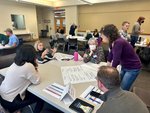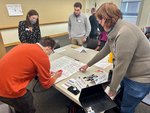



The United Way of Chatham County has been serving the county as an independent affiliate of the national United Way for nearly four decades. But its mission had a fundamental shift in the last year that coincided with changes and growth within Chatham itself.
“For the seven years now that I’ve been working here, we’ve been hearing ‘change is coming, change is coming,’” said Katie Childs, who became executive director of the UWCC two years ago after working earlier for the organization in a support staff role. “Well, change is now here. So how do we respond that?”
That question was central in conversations the UWCC’s board had while engaged in strategic planning work during 2022 — looking, too, at how COVID-19 changed the needs inside Chatham County, and how existing nonprofits were adapting during tumultuous times.
The United Way’s mission had been simply to increase the financial and human resources available to Chatham residents through its partnering agencies. It did that — and still does that — with an extended annual fundraising effort through businesses, neighborhoods and individuals, generating donations as an umbrella organization serving 15 local nonprofits, including the Boys & Girls Clubs, Communities In Schools, Chatham County 4-H, the Salvation Army and Chatham Literacy Council.
As part of this evolution, Childs said, “we dropped the first part” — which focused primarily on fundraising and grant-making — and instead homed in on a simple objective.
“Our new mission is to address the most critical needs of Chatham County residents — period,” she said.
“So that puts us in a much more active role than just raising money and making grants with that money,” Childs explained. “It really puts us in this central position to offer catalytic leadership to really move the needle on those needs.”
The shift was both strategic and necessary, she said, because local United Way agencies and other nonprofits are “so overwhelmed” trying to meet the basic needs of their own clients and raising funds from other sources to keep the doors open.
“There’s no capacity left for any one of them to step forward and say, you know, housing is an issue, or homelessness is an issue, or food insecurity or equitable youth education opportunities are issues,” Childs said — meaning, she added, no single entity is assigned the responsibility for the most pressing needs at any given moment.
“So that’s how we envision the United Way’s role changing in this new wave of development,” she said. “We envisioned ourselves becoming more of an active participant and an active leader in the coordination of addressing community needs.”
Childs emphasizes the United Way isn’t a service provider like the CORA Food Pantry or El Futuro or Chatham Cares Pharmacy, also among the agencies it helps fund.
“We don’t deliver service in any way,” she said. “But we can financially support those who are — and then we can coordinate some consolidated efforts around truly trying to move the needle on some big goals.”
And right now, that need involves housing and serving the homeless.
Chatham County’s affordable housing shortage is well-documented. And while the housing market has cooled slightly, earlier in 2022 the median price for homes being sold in the county hit $600,000 — for many, an unimaginable number in a county where two-thirds of renters earn less than 80% of the federally-defined average median income.
Earlier in 2022, the UWCC was approached by community members and Stephanie Watkins-Cruz, at the time Chatham County government’s policy analyst, about helping to facilitate a new housing and homelessness “working group.” In the meantime, Watkins-Cruz left the county — she’s now director of housing policy at the North Carolina Housing Coalition in Durham — and the county has begun work to develop its own formal housing division. That left the working group on its own, in a way, to address housing and homelessness.
And with a knowledge gap when it came to knowing exactly what to do next.
Childs said some members of the working group — which now numbers more than 70 people from two dozen organizations — met with a consulting group called Partners for Impact, which is helping to lead housing cooperatives in other N.C. counties. Chatham County agreed to help fund the consultant’s involvement, and the United Way is helping to manage the work and coordinate with partnering groups. Those groups include Love Chatham and the Salvation Army of Chatham County — both of which have been heavily engaged in providing assistance for Chatham’s homeless population — and other groups like Central Piedmont Community Action, Chatham Hospital, Second Bloom, the Chatham Sheriff’s Office, Habitat for Humanity and the county’s already-formed Affordable Housing Advisory Committee.
Those involved says it’s hard to put an exact number on Chatham’s homeless population, which have been aided with temporary housing through help from Love Chatham and the Salvation Army.
A “robust” count is planned for January, but for right now the working group is busy. It was awarded federal and local grants including $40,000 from Housing & Urban Development and $10,000 from Chatham County to hire a Street Outreach Coordinator whose job is to increase the ability of those in need to connect with vital local services through the outreach of a navigator. A partnership formed through the working group has resulted in the utilization of 15 emergency housing vouchers (provided by HUD) in Chatham — meaning that 15 individuals or families will be provided housing for at least a year, and have an opportunity to renew and extend the voucher if they still meet eligibility criteria after the first year.
The group has also utilized referral and client tracking software from partners Childs says “are on the front lines” of housing service delivery — Love Chatham, the Salvation Army, Central Piedmont Community Action, and Social Services, in addition to the United Way — allowing for less duplication and more collaborative efforts to provide elevated level of service to those in need.
And the working group continues to meet and expand.
Meanwhile, amid that effort, Childs and her United Way staff — Alane Coore, the finance officer and volunteer coordinator, and Shelley Smith, who coordinates outreach — are working to wrap up the 2022 fundraising effort. This year’s Chatham campaign, which technically ends Dec. 31, is short of its $750,000 goal.
“We have a little more than 25% to go, which, you know, is more than I would like to say,” Childs said.
Childs said she’s often asked by people in Chatham County why they should donate to the United Way rather than giving directly to agencies the United Way supports. She points to the Homeless and Housing Working group as a “real life” example of why.
“No single agency in Chatham County has been able to convene as many decision makers and key players around the table and focus on a single issue,” she said, “and really, truly build solutions around that because they’re all very busy with their own missions, their own full-time work. So by giving to United Way, you’re supporting the agency, certainly, but you’re also allowing for this level of leadership to be placed on top of that — so that all of our agencies can work in unison to achieve kind of this larger goal larger than any one of us could do on our own.”
Childs said donors no longer want to simply fund programs. They want to make investment in substantive, transformative change. And because there’s such a huge divide in Chatham between those who have and those who have not, she said, the needs and opportunities are aligning in a way never seen before.
So what better way than helping to close those gaps than through the United Way?, she asks. Chatham residents and business that give to the United Way through tax-deductible donations enable the organization to support 15 local nonprofits. In 2021, the UWCC’s annual campaign raised $733,000 — the most money in its 36-year history, surpassing its already-ambitious goal of $645,000. The bulk of those funds — 84% — came directly from organized neighborhood campaigns, and the campaign also featured a record number of individual donors and volunteers.
(Those funds don’t include another $87,500 the UWCC invested into three agencies — Communities In Schools, the Boys & Girls Club of Central Carolina and Chatham County NC Homeless Shelters — through its first-ever Issue-Based Grant program, focused on the issues of homelessness and COVID-19 learning loss.)
Childs said the needs here are so great, that as wonderful as last year’s campaign was, the funds were allocated quickly — and they weren’t enough.
“The needs support that [$750,000] goal,” she said of the current campaign. “We’re hoping we can get more participation, a larger number of donors. If we had more people give, the campaign will yield better results. Every gift does help, even if it’s small.”
Contributing the United Way, she said, is a simple and effective way to make a local charitable contribution that helps benefit a cross-section of the county. It’s also effective: 87% of UWCC’s budget goes directly to programs and services,
Childs says the UWCC “connects the dots” in Chatham by mobilizing resources, helping to identify basic needs, and working collaboratively to build a community where eradicating poverty and providing resources are tantamount. It’s not an easy task: in addition to many pockets of low income residents cost-burdened by housing expenses, many families struggle to put food on the table. More than one in three Chatham residents visited a food pantry in the last year, and the county’s growing senior population faces basic living expenses here much higher than the statewide average, according to United Way data.
But Childs is optimistic. Those 15 emergency housing vouchers, for example, wouldn’t have happened had the right people not been sitting around the same table at the same time.
“We’re really focusing on creating stable outcomes for people,” she said. “And it’s starting to happen.”